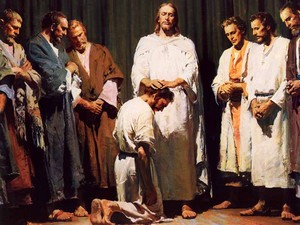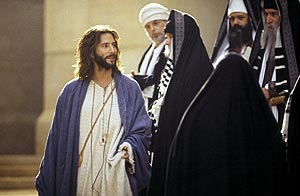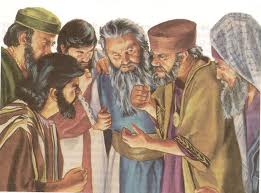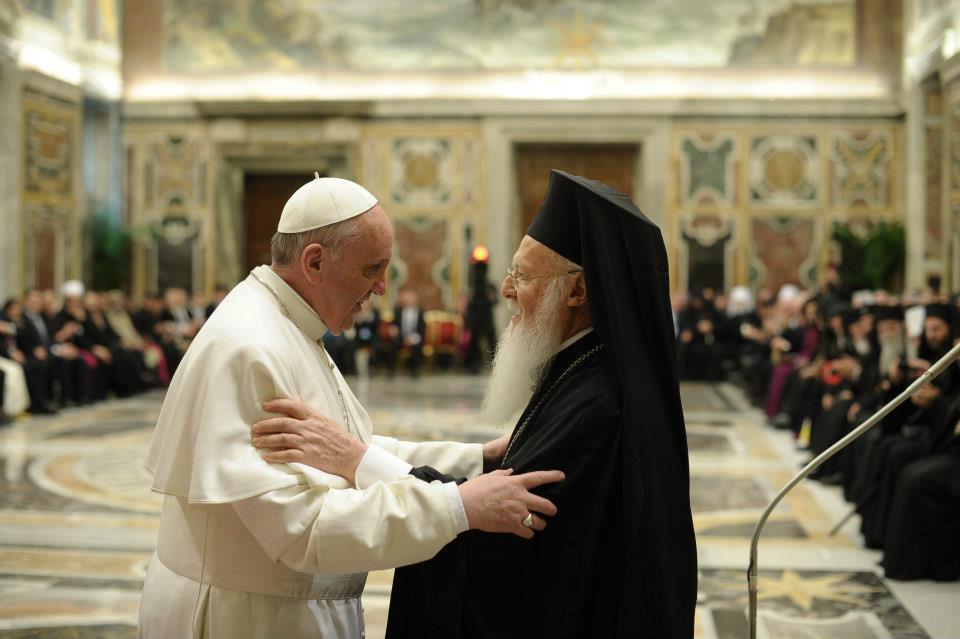
– 10-09-2023 –
Gospel Text: Matthew 18:15-20
 vs.15 Jesus said to his disciples:
vs.15 Jesus said to his disciples:
“If your brother does something wrong, go and have it out with him alone, between your two selves. If he listens to you, you have won back your brother.
vs.16 If he does not listen, take one or two others along with you; the evidence of two or three witnesses is required to sustain any charge.
vs.17 But if he refuses to listen to these, report it to the community; and if he refuses to listen to the community, treat him like a pagan or a tax collector.
vs.18 I tell you solemnly, whatever you bind on earth shall be considered bound in heaven; whatever you loose on earth shall be considered loosed in heaven.
vs.19 I tell you solemnly once again, if two of you on earth agree to ask anything at all, it will be granted to you by my Father in heaven.
vs.20 For where two or three meet in my name, I shall be there with them.”
*******************************************************************
We have four sets of homily notes to choose from. Please scroll down the page for the desired one.
Michel DeVerteuil : A Holy Ghost Priest, Specialist in Lectio Divina
Thomas O’Loughlin: Professor of Hist. Theol. Nottingham University
John Littleton: Director of the Priory Institute, Dublin 24
Donal Neary SJ: Editor of The Sacred Heart Messenger
****************************************
Michel DeVerteuil
Lectio Divina with the Sunday Gospels- Year A
General Comments
This passage is very different from those of the two previous Sundays. They were dramatic stories, marked by deep emotions and with deep implications for the characters involved. This is a little gem of a passage but with little drama, a very practical, common-sense teaching on that most common and most prosaic of community problems – conflict. It is deep wisdom teaching which continues to be valid for our time. Conflict management has become a science today, and Jesus’ teaching stands up well as a model of how to “manage” conflict in any situation.
As usual with lectio divina, we do not moralise. The conclusion of our meditation is not “Jesus tells us to do this,” but, “let us celebrate Jesus at work in the world.” We recognise moments of grace when we ourselves lived this teaching, and celebrate the great people who by word and example taught us to live it.
The teaching gives norms for dealing with local community conflicts – in families, neighbourhoods, church groups and workplaces – but also for the great conflicts of our time between races and ethnic groups, religions, nations, different social classes.
The passage is in two sections and we should try to see the link between them:
– Verses 15 to 17 are the teaching;
– Verses 18 to 20 give a spiritual foundation to the teaching.
It is therefore a good example of biblical teaching – practical moral teaching based on spirituality. Note that both aspects are valid for all people, believers or not.
 The Jesus way of dealing with conflict is to go through a series of procedures, starting with those which will cause least hurt, and gradually moving to more severe ones, always making sure that the others have been tried and have failed.
The Jesus way of dealing with conflict is to go through a series of procedures, starting with those which will cause least hurt, and gradually moving to more severe ones, always making sure that the others have been tried and have failed.
Verse 15 is the first step, a one-to-one meeting marked by discretion and privacy – done “by yourselves alone you have won back your brother.““. The conclusion has a touching simplicity
Verse 16 is the next stage, used only if the first has not worked. Those in authority must be humble enough to recognize when they lack the necessary qualities to influence the wrongdoer, and must seek help.
The text continues to stress the importance of discretion – just “one or two others” are invited to help.
The quotation from Deuteronomy must be interpreted correctly. The setting of the teaching is not a court of law, but a human community. Jesus is merely drawing an analogy – just as in a court the prosecution needs help, we too need help in settling community conflicts.
 Verse 17a is the third stage – recourse to the community. This can be interpreted as a plenary session or a meeting of the official leaders of the community. In either case the time for confidentiality is passed, the matter must be brought into the open.
Verse 17a is the third stage – recourse to the community. This can be interpreted as a plenary session or a meeting of the official leaders of the community. In either case the time for confidentiality is passed, the matter must be brought into the open.
Verse 17b brings in a new dimension. Jesus reminds us that a community must have its rules and a time comes when they must be insisted on. This verse complements what went before in a wonderful way. Without the previous verses, it would come across as harsh; without this verse, they would come across as naïve. By taking them together we enter into Jesus’ holistic, extraordinarily balanced teaching.
The reference to “pagans and tax collectors” is strange when we remember Jesus’ special care for these two groups. We can however take the expression as it stands, referring it to those whom the community has a right to exclude. In the light of Jesus’ other teaching, some would add, “remember you have to reach out to them also.”
Verses 18 and 19 can be, and have often been, misinterpreted. Perhaps under the influence of this teaching, Church leaders have assumed the right to pronounce judgement in the name of God – even deciding who will be consigned to hell. Our meditation must not lead us there, fostering arrogance in the exercise of authority. This is specially important when we are dealing with social conflicts, religious ones in particular.
In the prayer below, I propose an interpretation which sees Jesus as the model authority figure. He is not the kind of person (parent, community leader, spiritual guide) who delegates responsibility and then takes it back. He doesn’t want us to be always looking over our shoulders; he promises to back us in whatever we decide.
The mention of “the Father in heaven“ could be a hint that God’s way of delegating authority is the model for all fathers – physical and spiritual.
 Jesus knows that there is always the possibility of our making mistakes. Verse 19 then means that God knows what we are really trying to do when we decide to exclude a member of our community. He will not necessarily accept our verdict, but he will look with approval at the ideal we wanted to affirm.
Jesus knows that there is always the possibility of our making mistakes. Verse 19 then means that God knows what we are really trying to do when we decide to exclude a member of our community. He will not necessarily accept our verdict, but he will look with approval at the ideal we wanted to affirm.
Scripture Prayer Reflection
Lord, we thank you for sending us teachers who show us how to handle quarrels
– in our families, work places or Church communities;
– when we work together for social justice;
– between different religions.
Like Jesus and all good teachers, they don’t teach in the abstract,
but walk with us when we have to deal with a problem.
Someone does something wrong in our community
– treats another member unjustly;
– is dishonest with money;
– is unfaithful to marriage or religious vows;
– compromises the ideals of the group.

U.S. President. Jimmy Carter
We tend to talk about it among ourselves and outside the community, but you correct us through people like Jesus,
– one of our parents, a brother or sister, an aunt or uncle;
– someone in our workplace;
– a leader in our Church community;
– a friend.
They make us go and have it out with the wrongdoer, alone between our two selves, so that if they listen to us, without any fuss we have won back the brother or sister.
Things often don’t work out as simply as that, however.
It sometimes happens that those we try to correct don’t listen to us.
This is the moment when we need Jesus again, someone who will not allow us to give up, who will show us that perhaps we were the wrong person to make the approach,
– we lacked the expertise,
– didn’t listen enough,
– our race, nationality, age group or religion was too great an obstacle.
As in a court case where a prosecutor looks for two or three witnesses to sustain a charge, we must humble ourselves and look around for one or two others,
people more trusted or competent than we are,
take them along with us and have a meeting where we can talk things out honestly.
Sometimes this too fails, and we thank you that once more you do not abandon us;
you send us a friend or mentor who does not let us give up in discouragement,
makes us bring the problem to the community and have it discussed at a general meeting.
Lord, we know that when we have to exercise authority
some members in our community will disagree with us.
Remind us that we are all looking for the same goals:
– respect for the rights of all,
– freedom for ourselves,
– a sense of responsibility,
and that when we agree on anything you will grant it to us,
for where two or three of us meet in your name you are there with us.
Lord,
* Forgive us that when conflicts arise in our Church we make them public too quickly, we do not take time to have things out between ourselves alone first.
* Forgive us further that when this doesn’t work we give up;
we do not try to take one or two others along and see if the matter can be settled at that level.
* Forgive us again that at other times we sweep wrongdoing under the carpet instead of reporting it to the community and if necessary excluding those at fault.
Our problem is that we do not trust that wherever two or three of us are gathered in your name, you are there with us.
We are afraid that you will hold our mistakes against us, forgetting the promise of Jesus
that what we bind on earth will be bound in heaven and what we loose on earth will be loosed in heaven.
Lord, we pray that our Church will always work for harmony
between ourselves and other Churches and religions;
that when there are conflicts we will be the first to have things out between us by ourselves alone,
if necessary bringing along members from one or two other religious groups.
We pray that when we cannot resolve a conflict
we will be humble enough to report it to a national ecumenical or inter religious organization, even an international group like the World Council of Churches.
Remind us that where we human beings meet in your name whatever our faith, you are there with us.
*********************************************************
Thomas O’Loughlin
Liturgical Resources for the Year of Matthew
www.columba.ie
Introduction to the Celebration
We have just declared that we have gathered here as the people who in the Spirit’s power follow the way of the Son to the Father. However, we all know that following the way of the Lord is much easier said than done. Our own shortcomings lead us to stumble again and again, while the shortcomings of other Christians both hurt us directly and embarrass us. Yet we must continue our task of being disciples, we must be prepared to take the risk of pointing out the failings of others, and, what is even more difficult, we have to have the humility to hear and learn from those who point out our blind spots, weaknesses, and failings. Let us reflect on our need for forgiveness, our need to grow as disciples, and our need to have greater self-knowledge.
Homily Notes
1. Do you like having your faults, limitations, weaknesses, or biases pointed out to you?
 2. One of the few attitudes that one can safely assume is universal is that we do not like our faults pointed out, nor the faults of our children, nor the faults of our friends. When they are pointed out, we tend to become defensive (denying that the faults are real or that they are simply the produce of the biases and prejudices of the observer) or aggressive (‘You are patronising me!’ ‘You are interfering with my rights’). The proof of this is that in any industry where there is on-going staff assessment, those assessing fellow workers usually have immediate access to lawyers while the workers carry the emergency numbers of their union reps. Likewise, teachers know that even the most incompetent work has to be criticised only in the so-called ‘praise sandwich’: find something that is done well; then point out the blunders; then conclude with more commendations of the work!
2. One of the few attitudes that one can safely assume is universal is that we do not like our faults pointed out, nor the faults of our children, nor the faults of our friends. When they are pointed out, we tend to become defensive (denying that the faults are real or that they are simply the produce of the biases and prejudices of the observer) or aggressive (‘You are patronising me!’ ‘You are interfering with my rights’). The proof of this is that in any industry where there is on-going staff assessment, those assessing fellow workers usually have immediate access to lawyers while the workers carry the emergency numbers of their union reps. Likewise, teachers know that even the most incompetent work has to be criticised only in the so-called ‘praise sandwich’: find something that is done well; then point out the blunders; then conclude with more commendations of the work!
3. It is clear from the gospel that the community of the Christ is to be a little more robust in its way of doing things: the community is called to point out where sisters or brothers are not acting with love towards the community or projecting the lifestyle of the New People called into existence by Jesus.  This clash between the noting that the community can censure the behaviour of individual members and our inherent dislike of criticism is one of the reasons that many find Christianity distasteful. This is not a new objection to Christianity, but one that can be traced back across the centuries; and it has not been uncommon for people to accept Christianity but reject the notion that there is any place for ‘fraternal correction’ or an authority to excommunicate members. It is this text, after all, that has been cited for centuries as the ‘authority’ for a coercive canon law – and one does not have to be a sociologist to know that that is not a popular aspect of Christianity today!
This clash between the noting that the community can censure the behaviour of individual members and our inherent dislike of criticism is one of the reasons that many find Christianity distasteful. This is not a new objection to Christianity, but one that can be traced back across the centuries; and it has not been uncommon for people to accept Christianity but reject the notion that there is any place for ‘fraternal correction’ or an authority to excommunicate members. It is this text, after all, that has been cited for centuries as the ‘authority’ for a coercive canon law – and one does not have to be a sociologist to know that that is not a popular aspect of Christianity today!
4. Ironically, on the other hand; the fact that there is not enough fraternal correction by Christians is one of the main objections to Christianity, to the poor leadership of church leaders, and to Christians collectively. The church is condemned for not excommunicating dictators: witness the furore when an army chaplain was sent from Chile to Britain to celebrate midnight Christmas Mass for General Pinochet while detained there. This was seen as an example of church collusion with militarism and dictatorships. The churches are condemned for being chaplains to warlords and of glorifying warfare and ‘baptising’ nationalism and imperialism. The memory of Pius XII is vilified for not making statements about The Holocaust. The churches are condemned for having owned slaves and for not condemning slavery (and that support for slavery goes all the way back: note that St Patrick stated that part of the wickedness of the Irish was that they stole his family’s slaves – and they were a clerical family for at least three generations). Bishops are accused of covering up for, and not punishing, those clergy guilty of abusing children and vulnerable adults. And, part of the blame for the ecological crisis is usually laid at the way that Christians have interpreted Genesis 1:28: ‘Fill the earth and subdue it; and have dominion over the fish of the sea and over the birds of the air and over every living thing that moves upon the earth.‘ And the list goes on and on.  Moreover, in everyone of these cases there is more than a grain of truth: people expect those who claim to know the mind of God, or to be disciples, to have a higher awareness of morality and a greater courage in speaking out against falsehood, deceit, and injustice in the world.
Moreover, in everyone of these cases there is more than a grain of truth: people expect those who claim to know the mind of God, or to be disciples, to have a higher awareness of morality and a greater courage in speaking out against falsehood, deceit, and injustice in the world.
5. So when it comes to speaking out with a voice of ‘fraternal correction’ (no doubt this masculine language will be seen as another of the church’s blindspots) , Christians are ‘damned if they do, and damned if they don’t’.
6. What can we draw from today’s gospel that will help us? Perhaps all we can do is highlight the dilemma: we want others corrected, but not ourselves. Part of our human condition is that we may want to grow and improve, but we also want to avoid correction. We want to know and highlight the problems with others, but not ourselves. But it is already an improvement, when we have heard about this in-built contradiction in our make-up that is a stumbling block in the path of each us.
****************************************************************
John Litteton
Journeying through the Year of Matthew
www.Columba.ie
Gospel Reflection
Most people dislike being corrected and they are embarrassed if required to correct others. In addition, it is not politically correct nowadays to criticise other people. Certainly, it has always been regarded as bad manners to correct someone for grammatical errors in speech and writing, unless, of course, one is a teacher or a parent.
 However, once again Jesus teaches us that, as in so many other areas of life, Christians are called to be different from others regarding honest and necessary correction of family members, friends and colleagues. Christian discipleship demands that, in the words of Jesus, ‘if your brother does something wrong, go and have it out with him alone, between your two selves’ (Mt 18:15). This means that we are challenged to encourage other people to cease any behaviour and change any attitudes that prevent them from living fully Christian lives and allowing their souls to be saved.
However, once again Jesus teaches us that, as in so many other areas of life, Christians are called to be different from others regarding honest and necessary correction of family members, friends and colleagues. Christian discipleship demands that, in the words of Jesus, ‘if your brother does something wrong, go and have it out with him alone, between your two selves’ (Mt 18:15). This means that we are challenged to encourage other people to cease any behaviour and change any attitudes that prevent them from living fully Christian lives and allowing their souls to be saved.
Naturally, many of us avoid conflict situations. Often this inhibits us from saying what we know to be true. Many families today have members whose lifestyles contradict the faith they profess. For example, the widespread practice of unmarried couples living together as husband and wife is one of many instances of such disregard for God’s law of love. Yet, few of us are prepared to challenge, gently but firmly, our children or our brothers and sisters about the inappropriateness and sinfulness of such lifestyles.
 Similarly, few of us ever think about respectfully correcting colleagues in the workplace who, for example, use bad language and are intemperate or rude in their dealings with other people. We mistakenly follow society’s customs about tolerating all sorts of unacceptable behaviour instead of obeying the clear teaching of Jesus who tells us to correct one another when necessary.
Similarly, few of us ever think about respectfully correcting colleagues in the workplace who, for example, use bad language and are intemperate or rude in their dealings with other people. We mistakenly follow society’s customs about tolerating all sorts of unacceptable behaviour instead of obeying the clear teaching of Jesus who tells us to correct one another when necessary.
He goes even further. When the person we are correcting is unresponsive, Jesus advises us to seek the assistance of the wider Christian community so that the person being challenged and corrected will realise that creating mutual respect and harmonious relationships among people is the responsibility of the entire Christian community.
This teaching of Jesus is very clear. Yet it is widely ignored. Mark Twain once wrote: ‘Most people are bothered by those passages in scripture which they cannot understand; but as for me, the passages in scripture which trouble me most are those that I do understand.’ Could the same be true about us?
 Frequently, when we are faithful to Jesus’ teaching and when we correct other people gently but firmly in spiritual and religious matters, we are described as being uncharitable. Yet the gospel challenge is to correct one another in love and with respect so that the entire Christian community, all members of the Church of Christ, may glorify the wonder and the beauty of God who has made each one of us in the divine image and likeness.
Frequently, when we are faithful to Jesus’ teaching and when we correct other people gently but firmly in spiritual and religious matters, we are described as being uncharitable. Yet the gospel challenge is to correct one another in love and with respect so that the entire Christian community, all members of the Church of Christ, may glorify the wonder and the beauty of God who has made each one of us in the divine image and likeness.
For meditation
If he listens to you, you have won back your brother. (Mt 18:15)
***************************************************
Fr Donal Neary, S.J
Gospel Reflections for the Year of Matthew
www.messenger.ie/bookshop/
Each Other’s Keepers
In any group, small and big, things cause friction. Everyone thinks his or her way is right. We can fight over who is right. Some things are worth a fight, others not.
In the big questions of life, we need the advice, support and love of the other. Many people ask themselves, “Why I didn’t give an honest opinion about a decision like marriage or a job or a course of studies which seemed ill-advised to everyone?’ We all have good and not-so-good tendencies. We can only advise as best we can, sensitively and wisely, and hope we get a hearing.
We are afraid to hurt, to be rejected. Why do we let so many people drink themselves into trouble and never tell them? The terror of a neighbourhood, no matter what age, needs to be confronted. The problem of drugs in a neighbourhood is not confronted. Crime is not reported.
 In small and big things we are each others’ keepers. Jesus is saying something like that today. Parents can find this difficult as they try to guide the family well and not lose them. We have social responsibility in the family and in the neighbourhood and even worldwide for the common good.
In small and big things we are each others’ keepers. Jesus is saying something like that today. Parents can find this difficult as they try to guide the family well and not lose them. We have social responsibility in the family and in the neighbourhood and even worldwide for the common good.
God wants the best for each of us. We can help each other to goodness, we can support each other, advise each other, pray for and with each other, and help each other on our way to God.
Recall an occasion when another gave good advice,
even when you may not have liked it at the beginning.
Be grateful!
Give me wisdom, Lord, when others ask me for advice or an opinion.
***************************************************